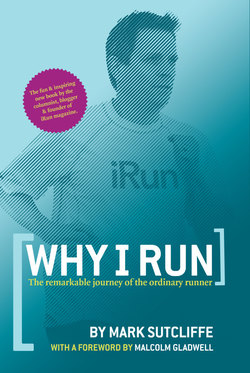Читать книгу Why I Run: The Remarkable Journey of the Ordinary Runner - Mark MDiv Sutcliffe - Страница 9
На сайте Литреса книга снята с продажи.
Reaching the tipping point
ОглавлениеiRun because running gives me so much in return Terry SanCartier, Quebec
“What happened to you?”
It’s not very often I get this question from my wife at the end of an 8k run. But it’s not very often I return from a short run with my shirt absolutely soaked with sweat and looking like I just ran for my life from a family of bears.
What happened to me was Malcolm Gladwell. The brainiac best-selling author was in Ottawa in June 2009 for a United Way event at which I was given the privilege of interviewing him onstage at the National Arts Centre.
Gladwell is renowned for his thought-provoking analytical research and powerful storytelling that have yielded the hugely successful books The Tipping Point, Blink and Outliers. But long before he was a champion of non-fiction, Gladwell was a top-ranked middle-distance runner. As a teenager, he was Ontario’s best 1,500-metre runner and set a Canadian record in his age category.
In our brief chat before we went on stage, I asked him if he was still running. Gladwell said chronic knee problems limited him to about forty minutes per run, but he still got out several times a week.
As a matter of fact, he added, he was planning to go for a run that evening in Ottawa, once our event was over.
Really?
But he wasn’t sure where to run. He knew of the path along Ottawa’s Rideau Canal, but because of his knees he wanted to run somewhere that offered a softer running surface alongside the path.
I told him about the route along the Ottawa River, starting at the locks behind the Château Laurier. It’s scenic, secluded and, unlike the canal path, lined with grass. And, sensing an opportunity, I offered to join him if he wanted a tour guide.
We had a brief discussion about pace, which is the runner’s equivalent of a speed-dating conversation: a quick determination of compatibility. Gladwell modestly suggested he might be too slow for me, but I wasn’t buying it.
“Did you run competitively in high school or university?” Gladwell asked me before we set off.
Uh, no. My main sport in high school was the Reach for the Top quiz-show team.
After translating miles into kilometres, we determined, not surprisingly, that his casual pace was the same as a tempo run for me. So, if we weren’t ideal running partners, we were at least compatible. We agreed to meet at the front door of his hotel later in the evening.
Once our event was over, I raced home to change into running gear and got back just in time. We took the steps down to the locks and started off at a quick but manageable pace. At least that’s what it was for me.
I asked Gladwell about his running career, and he said he gave up competitive running when he realized there were other athletes who were willing to push themselves to painful places more often and for longer than he was. He asked me about my writing and my running magazine, and I noticed it was a lot harder for me to get my words out than it had been for him.
And that was before he started speeding up.
If you think Malcolm Gladwell can give your mind a workout, wait until you run with him. As he picked up the tempo, the sweat started pouring down my face, while he continued to look like he was in the middle of a pleasant stroll. He would get a metre or two ahead of me and I would fight my way back to stay even, maybe because he would politely slow down or maybe because I was cutting the corners on the route.
In my defence, I had already run that morning and also biked downtown and back. And normally when I run at this pace, I’m not usually trying to maintain an interesting discussion with one of my writing heroes. Normally when I do a tempo run, I’m trying to get value from the workout, not the conversation.
Not that I would have kept up with him even if I’d tapered for a week. I told him I normally run with a chartered accountant and public-policy consultant who’s ten years older than me, not a former 1,500-metre record-holder with ancestry similar to that of Usain Bolt.
I hung on for as long as I could, but about six kilometres into the run, when the finish line was straight ahead and I no longer had to supply directions, I politely suggested to Gladwell that he go ahead and I would meet him at the end of our route.
On the stretch behind the Parliament Buildings, I settled into a more comfortable pace and watched him slowly build up the distance between us until he disappeared around a corner.
Running with Malcolm Gladwell was a treat and a privilege. But let’s just say I had reached the tipping point.
